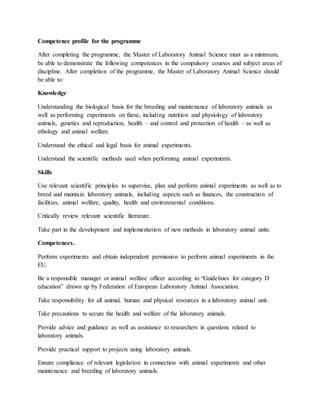Competence profile for the programme
•Download as DOCX, PDF•
0 likes•62 views
Report
Share
Report
Share

Recommended
There is every indication that much of that is described in this publication also applies to the epigenetic transgenerational effects of pre conceptual consumption of alcohol by the father.
What is required is the same detailed research for the role of alcohol.
Barry StanleyPlos one: pesticide methoxychlor promotes the epigenetic transgenerational in...

Plos one: pesticide methoxychlor promotes the epigenetic transgenerational in...BARRY STANLEY 2 fasd
Recommended
There is every indication that much of that is described in this publication also applies to the epigenetic transgenerational effects of pre conceptual consumption of alcohol by the father.
What is required is the same detailed research for the role of alcohol.
Barry StanleyPlos one: pesticide methoxychlor promotes the epigenetic transgenerational in...

Plos one: pesticide methoxychlor promotes the epigenetic transgenerational in...BARRY STANLEY 2 fasd
More Related Content
Viewers also liked
Viewers also liked (12)
Total Turnkey DAS: A Path to Ensure Rapid Business Growth and Career Success

Total Turnkey DAS: A Path to Ensure Rapid Business Growth and Career Success
Instrumentos de Corte en Odontología: La Turbina dental y Fresas de corte más...

Instrumentos de Corte en Odontología: La Turbina dental y Fresas de corte más...
ccabab6f-3876-4244-a69f-1c732e887fa5-151023170141-lva1-app6892

ccabab6f-3876-4244-a69f-1c732e887fa5-151023170141-lva1-app6892
Primer Ministerio que logra innovar estrategicamente

Primer Ministerio que logra innovar estrategicamente
Similar to Competence profile for the programme
Similar to Competence profile for the programme (20)
research safety in laboratory ,welfare of animal use in research - .pptx

research safety in laboratory ,welfare of animal use in research - .pptx
Animal Testing: Rationale for conducting studies, CPCSEA Guidelines 

Animal Testing: Rationale for conducting studies, CPCSEA Guidelines
cpcsea guidelines for laboratory animal facility-pptx

cpcsea guidelines for laboratory animal facility-pptx
ETHICS-IN-LABORATORY-TECHNIQUES-and-MANAGEMENT-Prof-Aziba.pdf

ETHICS-IN-LABORATORY-TECHNIQUES-and-MANAGEMENT-Prof-Aziba.pdf
Prevention Of Cruelty To Animals Act-1960 - Copy.pptx

Prevention Of Cruelty To Animals Act-1960 - Copy.pptx
Competence profile for the programme
- 1. Competence profile for the programme After completing the programme, the Master of Laboratory Animal Science must as a minimum, be able to demonstrate the following competences in the compulsory courses and subject areas of discipline. After completion of the programme, the Master of Laboratory Animal Science should be able to: Knowledge Understanding the biological basis for the breeding and maintenance of laboratory animals as well as performing experiments on these, including nutrition and physiology of laboratory animals, genetics and reproduction, health – and control and protection of health – as well as ethology and animal welfare. Understand the ethical and legal basis for animal experiments. Understand the scientific methods used when performing animal experiments. Skills Use relevant scientific principles to supervise, plan and perform animal experiments as well as to breed and maintain laboratory animals, including aspects such as finances, the construction of facilities, animal welfare, quality, health and environmental conditions. Critically review relevant scientific literature. Take part in the development and implementation of new methods in laboratory animal units. Competences. Perform experiments and obtain independent permission to perform animal experiments in the EU. Be a responsible manager or animal welfare officer according to “Guidelines for category D education” drawn up by Federation of European Laboratory Animal Association. Take responsibility for all animal, human and physical resources in a laboratory animal unit. Take precautions to secure the health and welfare of the laboratory animals. Provide advice and guidance as well as assistance to researchers in questions related to laboratory animals. Provide practical support to projects using laboratory animals. Ensure compliance of relevant legislation in connection with animal experiments and other maintenance and breeding of laboratory animals.
- 2. Be responsible for the internal and external educational programmes of laboratory animal unit in relation to adhering to principles of the Three Rs. Take an active part in the development of innovative concepts for human use of laboratory animals and carry out research within the field of Laboratory Animal Science and welfare.